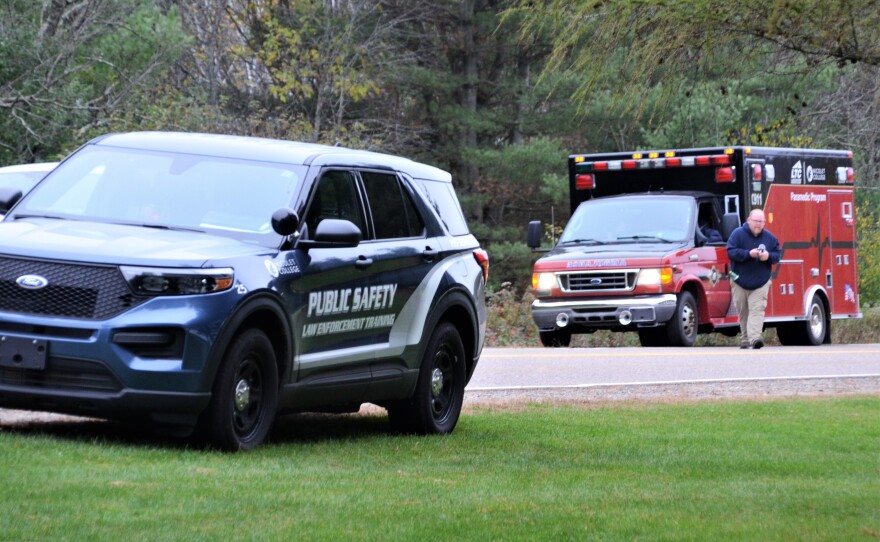It started with a call coming into the police, or in this scenario, students in Nicolet College’s law enforcement program.
When Zachary Irish arrived on scene all he knew was that there a report of an unresponsive man at a table near the field.
But like real life, this scenario was much more complicated.
“When I arrived on scene and walked up, the individual had a knife which surprised me. I wasn’t prepared for that,” said Irish.
Irish slowly approached the man and kept him talking relying on the training he’s gone though at Nicolet.
“We were able to de-escalate the situation, negotiate it into him giving it to me peacefully and we came to a peaceful resolution,” he said.

Once he was able get the knife away and secure the scene, paramedics we’re called in.
These students also went through their training, checking over the man who was found with an empty alcohol and pill bottles and mentioned he had suicidal thoughts.
Once he was buckled into a gurney and loaded into an ambulance, he was taken to the college nursing labs, which for this scenario have been transformed into Nicolet Hospital.
The man was brought in where a pair of nursing students go through their training and provide medical care for the patient.
The scenario ends once the patient is deemed stable and counselors from the Human Services Center come in a create a treatment plan for the patient and start case management.
Responding to mental health calls is increasingly becoming a part of police officers and health professionals’ everyday life.
While it may be a common scenario, it’s one that students training to be officers, EMTs, and nurses don’t get to experience until they’re on job, especially all together.
This week Nicolet College held a large-scale training exercise that involved multiple disciplines.
It was a first a of its kind training for the college.

Dilya St. Louis is a nursing instructor at Nicolet College and the one who put this together.
St. Louis secured a grant for the college to do these trainings and hopes to expand them and involve more students in future one.
The grant came from the Wisconsin Northern Highland Area Health Education Center. The organization also helped with some of the planning for the exercise.
The AHEC Executive Director Gail Kell attended the training exercise.
“I think this is awesome. I love just being able to interact with the students and seeing these crossroads of professions that don’t interact with one another,” said Kell. “Just having that team-based approach and that better increased understanding of what each roll in the field looks like and how we interact in the real world.”
St. Louis wanted a suicidal subject scenario for the first one of these trainings because she knows it will be a common real-life scenario these students will encounter.
“I personally, previously working in the emergency department as an ER nurse, I have seen the mental health crisis as a very common scenario, especially as suicidal ideations or suicide attempts. This is very real, especially being in a rural community and you’re in the pandemic. That situation actually worsened,” said St. Louis.
Studies have shown suicide rates are about 25% higher in rural areas as compared to urban ones.
More than the technical know-how of going through the proper steps, St. Louis said it’s the communication aspect that’s most important in these scenarios.
Textbooks can’t teach the students how to talk to someone with suicidal thoughts or how to best work with professionals from other agencies.
“When we have a graduates come out and work, for example, in emergency department, they feel quite intimidated, first of all to talk to that patient who is suicidal because it’s not a technical skill, it’s the communication skill you have to be proficient at. Sometimes they lack that,” said St. Louis.
It’s training that students like Irish, the officer that first responded to the scene, knows he’ll be depend on as pursues his career in law enforcement.
“It was a great experience. It was a great learning experience. It was the first time that I’ve had a scenario that we were able to bring in all the different parties here at Nicolet College,” said Irish.
If you are struggling with suicidal thoughts, there is help available.
You can call the Suicide Prevention Hotline at 1-800-273-8255 to talk to someone right now.













